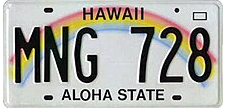Free Hawaii License Plate Lookup
Search and lookup any HI license plate and get a free vehicle report
Hawaii (HI) presents a unique car market shaped by its island geography and diverse culture. The state’s tropical climate and picturesque landscapes make it a popular destination for both residents and tourists, influencing the types of vehicles in demand. In Hawaii, there is a notable preference for versatile and durable vehicles like SUVs and trucks that can handle the island’s varying terrain, from urban roads to rugged coastal areas. Additionally, the popularity of electric and hybrid vehicles is growing due to Hawaii’s commitment to sustainable living and environmental conservation.
Despite the appealing variety of vehicles available, buying a used car in Hawaii comes with specific challenges. The island environment, characterized by salty sea air and humidity, can lead to faster corrosion and wear on vehicles. Prospective buyers must be vigilant about rust and other weather-related issues that might not be immediately visible. Furthermore, the limited land space and import costs can sometimes result in higher vehicle prices compared to the mainland, necessitating thorough research and negotiation.
To ensure a sound investment when purchasing a used car in Hawaii, conducting a comprehensive Hawaii license plate lookup is essential. Our detailed HI license plate lookup tool provides vital information on a vehicle’s history, including previous ownership, accident reports, and maintenance records. This tool helps buyers make informed decisions, reducing the risk of acquiring a vehicle with hidden problems and ensuring a smoother, more reliable buying experience.
Table of Contents:
- What information can you get from a Hawaii license plate lookup?
- What is a Hawaii license plate?
- How do I get a license plate in Hawaii?
- Can I transfer my Hawaii license plate to another vehicle?
- How can I find the owner of a license plate in Hawaii?
- Can you look up vehicle records and history by VIN in Hawaii?
Hawaii DMV Contact:
 Phone: (808) 768-4325
Phone: (808) 768-4325
Hours of Operation:
Monday – Friday, 8 a.m. – 4 p.m.
VinCheckPro offers an excellent service for checking Hawaii license plates, providing detailed information on registered vehicles in the region. This tool gives users a wealth of information, making it easier to thoroughly assess a vehicle’s history before making any purchase decisions.
- Accidents or Damages: This crucial section covers any incidents affecting the vehicle, including collisions and damage from external factors like vandalism or fallen objects.
- Odometer Indications: Easily compare reported mileage against the actual odometer reading to ensure accuracy and uncover potential discrepancies.
- Recalls & Defects: Stay informed about any recalls or known defects associated with the specific make and model of the vehicle.
- Lien & Repossession Records: Understand if the vehicle has been used as collateral in a loan, helping you avoid financial entanglements.
- Theft & Recovery Records: Discover if the vehicle has been reported stolen and subsequently recovered, providing critical insight into its history.
- Flood, Hail, and Fire Damage: Learn about any damage resulting from natural disasters, which can have long-term implications for the vehicle’s integrity.
- Mileage Rollback: Guard against odometer fraud by verifying the reported mileage against historical records.
- Sale history, estimated ownership costs, and market value: This information provides valuable insights into the vehicle’s past, potential future expenses, and current market value.
- Vehicle Specifications: Ensure that all standard equipment, including body color and tires, align with the vehicle’s description.
- Previous Use: Identify if the vehicle has been utilized for personal, taxi, or police purposes, offering insight into its past usage.
- Service, Inspection, and Registration History: Gain a comprehensive overview of the vehicle’s maintenance and registration records, providing valuable context for its overall condition.
Our Hawaii license plate lookup service allows for easy access to detailed car reports, simplifying the vehicle buying process through informed decision-making. Try our reliable service today by requesting your personalized report and receiving it quickly!
 A license plate in Hawaii refers to a state-issued metal or plastic plate that is attached to both the front and rear of a vehicle registered within Hawaii. Typically, non-commercial vehicles receive one plate for the rear, while commercial vehicles are provided with two plates for both front and rear placements.
A license plate in Hawaii refers to a state-issued metal or plastic plate that is attached to both the front and rear of a vehicle registered within Hawaii. Typically, non-commercial vehicles receive one plate for the rear, while commercial vehicles are provided with two plates for both front and rear placements.
These license plates are manufactured by Hawaii’s Department of Transportation and necessitate annual renewal. Their primary function is to validate vehicle registration and aid law enforcement in identifying vehicles linked to accidents or unlawful activities.
Hawaii offers various license plate options for drivers to select from, including:
-
- Standard – commonly used for personal vehicles in Hawaii
- Personalized – individuals can choose their own letter and number combinations, as long as they meet certain requirements. It can include your name, a special date, a favorite hobby, or even a clever phrase.
- Specialty – available for individuals who would like to express their support for a certain cause or organization
To obtain a Hawaii license plate, visit the nearest county DMV office to register your vehicle. You have a 30-day window to complete this registration after becoming a Hawaii resident or purchasing a vehicle from out of state. Missing this deadline may lead to penalties and fines. If you’re buying a used vehicle in Hawaii, you may need to transfer the license plates from the previous owner or obtain new ones from the DMV.
For vehicle registration and getting a Hawaii license plate, you’ll need to provide the following documents:
- Hawaii Driver’s License or Identification Card
- Proof of ownership (such as the vehicle’s title or registration from the previous state)
- Proof of Hawaii residency
- Vehicle inspection certificate
- Proof of insurance
- Payment for registration fees and any applicable taxes
In Hawaii, vehicle registration fees depend on several factors, including the vehicle’s weight, model year, and its intended use. Extra costs may apply for personalized license plates or other services.
With all the necessary documents and fees in hand, visit your local county Department of Motor Vehicles (DMV) office to finalize the registration. Hawaii law requires license plates to be displayed on both the front and back of the vehicle, securely attached, and visible from at least 50 feet during daylight hours.
For more information about obtaining license plates and completing vehicle registrations in Hawaii, contact:
Honolulu Service Center
925 Dillingham Blvd
Honolulu, HI 96817
Hilo Service Center
349 Kapiolani Street
Hilo, HI 96720
Maui Service Center
70 E Kaahumanu Ave
Kahului, HI 96732
Kauai Service Center
4444 Rice Street
Lihue, HI 96766
In Hawaii, it’s generally possible to transfer your license plate from one vehicle to another, subject to specific conditions. Here are the key points to keep in mind when transferring your Hawaii license plate:
- Qualification: You must be the registered owner of both the current vehicle bearing the plate you wish to transfer and the new vehicle you intend to transfer the plate to.
- Plate Type: Different rules and fees may apply based on the type of license plate you have, such as personalized or specialty plates.
- Transfer Costs: There could be fees associated with transferring your license plate, which may vary depending on factors like plate type and the county where the transfer is processed.
- County Vehicle Registration Office: Begin the transfer process by visiting your local County Vehicle Registration Office. Bring along the following documents:
- Current vehicle registration for the vehicle holding the plate you want to transfer.
- Current vehicle registration for the new vehicle.
- Personal identification, such as a driver’s license.
- Payment for any applicable fees.
- Complete Transfer: At the County Vehicle Registration Office, complete the necessary paperwork to transfer the license plate from the old vehicle to the new one. This may involve filling out a transfer application or providing relevant details.
- New Registration: Once the transfer is finalized, you’ll receive a new vehicle registration for the new vehicle with the transferred license plate.
- Installation: Follow instructions to install the license plate securely on the new vehicle.
Keep in mind that the specific procedures and charges for transferring license plates in Hawaii can differ based on individual circumstances and plate types. For the most accurate and current guidance, consider reaching out to your local County Vehicle Registration Office or checking their official website.
Accessing the owner’s details linked to a license plate in Hawaii is generally restricted to ensure privacy compliance. For legitimate needs, individuals can reach out to law enforcement agencies, make requests through the Hawaii Department of Transportation (HDOT) under certain circumstances, or consult legal experts for assistance with legal issues.
It’s crucial to note that attempting to access this information without authorization or in violation of privacy laws can result in legal penalties. Therefore, it’s important to have a valid and lawful reason for seeking such details and to adhere to the correct procedures.
Certainly! You have the option to check a vehicle history using the VIN in Hawaii through platforms such as VinCheckPro.com. These platforms offer access to comprehensive reports detailing the vehicle’s title history, accident records, recall information, mileage logs, and other pertinent data. Conducting a VIN-based history check is a crucial precautionary measure when purchasing a pre-owned vehicle, ensuring that you possess thorough insights into its previous experiences. This knowledge empowers you to make well-informed decisions and steer clear of potential complications associated with the vehicle. VIN checks in Hawaii furnish crucial insights into a vehicle’s background, aiding in the assessment of its overall state and dependability.